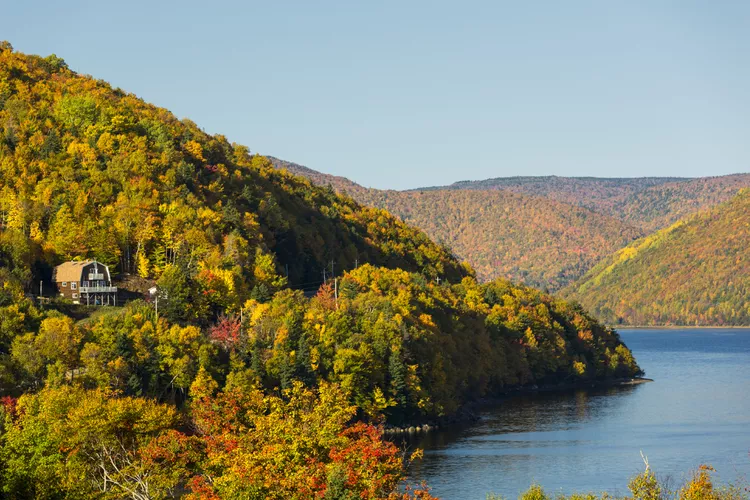Overview
- 1. Introduction to Cape Breton and its unique identity.
- 2. Getting to Cape Breton: Travel options and accessibility.
- 3. Weather and the best times to visit Cape Breton.
- 4. Highlights of Cape Breton: Nature, food, and music.
- 5. Exploring the Cabot Trail: Scenic beauty and attractions.
- 6. Accommodation options in Cape Breton.
- 7. Culinary experiences and local seafood in Cape Breton.
- 8. Events and festivals: Celebrating culture in Cape Breton.
Cape Breton Travel: Embrace Celtic Culture, Music, and Seafood Galore
Cape Breton is an island located at the tip of Nova Scotia, part of the Maritime provinces in Eastern Canada. Although it is technically part of Nova Scotia, Cape Breton boasts a distinct identity characterized by its rich Celtic heritage, which can be experienced through local music, cuisine, and the warm hospitality of the locals. Additionally, Cape Breton is home to one of the world’s most picturesque drives: the Cabot Trail.
Getting to Cape Breton
Most travelers arrive in Cape Breton via Halifax, the capital of Nova Scotia. Upon landing at Halifax International Airport, renting a car is a convenient option for the roughly three-hour drive to the island. A notable access point is the Causeway, which connects the mainland of Nova Scotia to the island.
Sydney, situated on the island’s southeast coast, also features a smaller airport, enhancing accessibility for visitors.
Cape Breton Weather and Climate / When to Visit
The prime time for visiting Cape Breton is during July, August, and September. However, spring and late fall remain appealing, particularly during the week of the Celtic Colours Festival in October, which draws tourists eager to experience local culture.
Weather can be unpredictable throughout the year; thus, packing layered clothing is advisable to accommodate various conditions. Locals often joke that you can experience four seasons in a single day. Summers can be hot and humid, interspersed with fog, strong winds, and cooler spells. Autumn is breathtaking, offering vibrant fall foliage, particularly along the Cabot Trail. Spring and winter tend to be quieter, presenting opportunities for budget-friendly travel.
Cape Breton Highlights
Cape Breton presents more than the acclaimed Cabot Trail and the historical site of Louisbourg. Nature enthusiasts can enjoy whale watching and explore the magnificent landscapes of Cape Breton Highlands National Park. Seafood lovers will delight in fresh catches such as lobster, crab, and other local specialties, while music enthusiasts will be pleasantly surprised by the high-quality performances available, even in the tiniest venues. Moreover, options abound for golf, shopping, and other activities.
The Cabot Trail
Named after explorer John Cabot, the Cabot Trail encircles the northern expanse of Cape Breton Island. Typically, tourists start and end their journey in the town of Baddeck, traversing the 300 km (185 mi.) route. The highway is celebrated for its breathtaking views of the Gulf of St. Lawrence, the Atlantic Ocean, and lush greenery, especially vivid during the fall season. The Cape Breton Highlands National Park represents the highest point along the trail. While driving the trail can take a few hours, many visitors opt to spend a day or two exploring the quaint towns that line the route.
Accommodation in Cape Breton
In Cape Breton, hotel chain options are limited primarily to Sydney, Nova Scotia’s second city. Travelers typically choose from Bed and Breakfasts or local hotels, most of which are small to medium-sized and privately owned. Although some accommodations may exude rustic charm with occasional quirks, the warmth and friendliness of the proprietors often compensate. Elegant resorts, such as the Keltic Lodge in Ingonish Beach, provide more upscale alternatives.
Additionally, the Normaway Inn in the picturesque Margaree River Valley offers stays in the main building or nearby chalets. This accommodation is within easy reach of the Barn, a venue that features live music performances from June through October.
Eating in Cape Breton
Food lovers will find a seafood paradise in Cape Breton, especially lovers of lobster. The local McDonald’s even offers a McLobster sandwich. Other specialties to indulge in include crab cakes, delectable seafood chowder (do not miss the version at Glenora Distillery), and oat cakes for breakfast or tea. Don’t forget to complement your meal with a glass of Nova Scotia wine, such as L’Acadie.
Cape Breton Events and Festivals
Cape Breton hosts a variety of exciting events and festivals, with the highlight being the Celtic Colours Festival. This multi-day celebration brings together communities for music performances and an appreciation of the enchanting Celtic culture, set against a backdrop of stunning autumn hues.
The month-long Lopsterpalooza is another not-to-miss event, showcasing seafood and lobster delicacies along the Cabot Trail.
Additionally, the Stan Rogers Festival, also known as Stanfest, pays tribute to the beloved Maritime musician with an impressive lineup of folk, rock, Celtic, and other musical performances.





